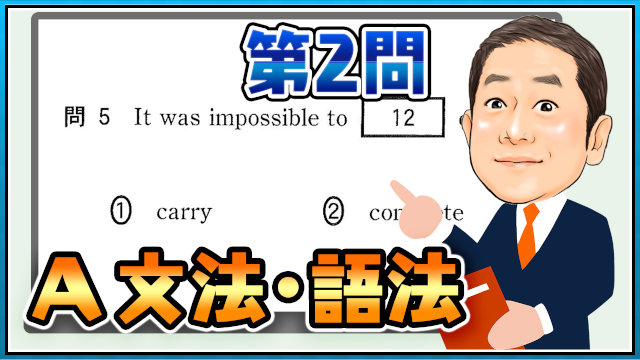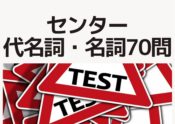2016年度 センター英語第2問A 文法・語法 問題&解説

大手予備校で中1から高3の基礎クラスから東大クラスまでほとんどのクラスを担当しました。映像授業にも多数出演経験あり。
元東海大非常勤講師。
「大学入試英語解く得!」は最高PV数 34,212 / 日
質・量ともに日本一分かりやすい大学入試英語対策ページを目指します!
資格:英検一級、通訳案内士(英語)、TOEIC950点
趣味:海外旅行、食べ歩き
特技:将棋アマ六段 (全国レーティング選手権優勝 1998)
元技術翻訳者、元富士通
今回の内容
1. 2016年度センター英語第2問A 文法・語法 問題
それぞれ①~④のうちから一つずつ選べ。ただし、問8~10については、( A )と( B )に入れるのに最も適当な組み合わせを選べ。
1. The train ( ) when I reached the platform, so I didn’t have to wait in the cold.①had already arrived ②has already arrived ③previously arrived ④previously arrives
2. ( ) Tokyo has a relatively small land area, it has a huge population.
①Although ②But ③Despite ④However
3. Children ( ) by bilingual parents may naturally learn two languages.
①bringing up ②brought up ③have brought up ④were brought up
4. My sister was not a serious high school student, and ( ).
①either I was ②either was I ③neither I was ④neither was I
5. Before the movie begins, please ( ) your mobile phone is switched off.
①keep ②make sure ③never fail ④remind
6. We have made good progress, so we are already ( ) schedule.
①ahead of ②apart from ③far from ④out of
7. Thanks to their ( ) comments after my presentation, I felt very relieved.
①friendly ②nicely ③properly ④warmly
8. ( ) you’ve completed his required class, you ( ) be able to graduate.
①A:If B:won’t ②A:Unless B:would ③A:Until B:won’t ④A:While B:would
9. Wood ( ) be used as the main fuel, but nowadays fossil fuels ( ) widely.
①A:used to B:are used ②A:used to B:have been used ③A:was used to B:are used ④A:was used to B:have been used
10. ( ) so considerate ( ) him to come and see his grandmother in the hospital every day.
①A: He is B: for ②A: He is B: of ③A: It is B: for ④A: It is B: of
2. 2016年度センター英語第2問A 文法・語法 解説
1. The train ( ) when I reached the platform, so I didn’t have to wait in the cold.
①had already arrived ②has already arrived ③previously arrived ④previously arrives
【 時制 】
・列車が着いたのは、プラットフォームに到着した過去よりも過去なので、過去完了形を使う。
私がプラットフォームに到着したときには電車はすでに到着していたので、私は寒い中待つ必要がなかった。
2. ( ) Tokyo has a relatively small land area, it has a huge population.
①Although ②But ③Despite ④However
【 接続詞・副詞 】
・although「~だけれども」 譲歩節を作る接続詞。small ⇔ huge が対比になっている。
・butは等位接続詞。A but B 「AしかしB」の形で使う。
Tokyo has a relatively small land area, but it has a huge population. ならOK
・Despite「~だけれども」 / However「しかし」 は副詞なので節を作ることができない。
東京は比較的小さい陸地面積しか持たないが、莫大な人口がいる。
3. Children ( ) by bilingual parents may naturally learn two languages.
①bringing up ②brought up ③have brought up ④were brought up
【 分詞 】
・カッコの直後のbyに注目。カッコ内には過去分詞が入ると考える。
「~によって育てられた子ども」
・bring up ~ 「~を育てる」
・④のように受動態を選ぶとmay ~ learn があるので動詞が2つの構造になってしまう。
二ヶ国語を話す両親によって育てられた子どもは、自然に二ヶ国語を習得するかもしれない。
4. My sister was not a serious high school student, and ( ).
①either I was ②either was I ③neither I was ④neither was I
【 否定・倒置 】
・否定文+neither V S 「Sもそうでない」
・neitherの後ろは倒置になることに注意。
私の姉は真面目な高校生ではなかったし、私もそうではなかった。
5. Before the movie begins, please ( ) your mobile phone is switched off.
①keep ②make sure ③never fail ④remind
【 動詞・熟語 】
・make sure (that) ~ 「~を確認する」
・remindもthat節を取れるが直後に目的語(人)が必要
remind O(人) that ~「O(人)に~を思い出させる」
映画が始まる前に、携帯電話の電源が消されていることを確認して下さい。
6. We have made good progress, so we are already ( ) schedule.
①ahead of ②apart from ③far from ④out of
【 前置詞・熟語 】
・ahead of schedule 「予定よりも早く」 ←ahead of ~ 「~より前に」
・apart from ~「~から離れて、~は別として」far from ~「決して~ではない」
私たちは順調に進んでいるので、すでに予定よりも早い。
7. Thanks to their ( ) comments after my presentation, I felt very relieved.
①friendly ②nicely ③properly ④warmly
【 形容詞・副詞 】
・後ろにcommentsという名詞が続いているので形容詞を選ぶ。形容詞はfriendlyのみ。
私のプレゼンテーションのあとの彼らの好意的なコメントのおかげで、私はとても安心した。
8. ( ) you’ve completed his required class, you ( ) be able to graduate.
①A:If B:won’t ②A:Unless B:would ③A:Until B:won’t ④A:While B:would
【 接続詞 】
・「修了したら卒業できる」か「修了しなければ卒業できない」の何れかの内容になるはず。
・until ~ 「~まで (ずっと)」
・unless ~「~しない限り」while ~「~だけれども」
この必須の授業を修了するまで、あなたは卒業することができません。
9. Wood ( ) be used as the main fuel, but nowadays fossil fuels ( ) widely.
①A:used to B:are used ②A:used to B:have been used ③A:was used to B:are used ④A:was used to B:have been used
【 助動詞・時制 】
・used to V「かつてVしたものだ」
be used to V 「Vするために使われる」 be used to Ving「Vすることに慣れている」
・nowadays「最近」は現在形と共に用いる。現在完了と用いるのはrecently, lately
木材は主要な燃料としてよく使われたものだが、最近は化石燃料が広く使われている。
10. ( ) so considerate ( ) him to come and see his grandmother in the hospital every day.
①A:He is B:for ②A:He is B:of ③A:It is B:for ④A:It is B:of
【 it・形容詞 】
・形容詞がconsiderate「思いやりがある」のように人の性質を表す語の場合、forではなくofを用いる。
・It is considerate of him = he is considerate
毎日、病院にいる祖母に会いに来るとは、彼は思いやりがある。
5. YouTubeの「2016年センター英語本試験 2A 文法・語法」はこちら
大手予備校で中1から高3の基礎クラスから東大クラスまでほとんどのクラスを担当しました。映像授業にも多数出演経験あり。
元東海大非常勤講師。
「大学入試英語解く得!」は最高PV数 34,212 / 日
質・量ともに日本一分かりやすい大学入試英語対策ページを目指します!
資格:英検一級、通訳案内士(英語)、TOEIC950点
趣味:海外旅行、食べ歩き
特技:将棋アマ六段 (全国レーティング選手権優勝 1998)
元技術翻訳者、元富士通






